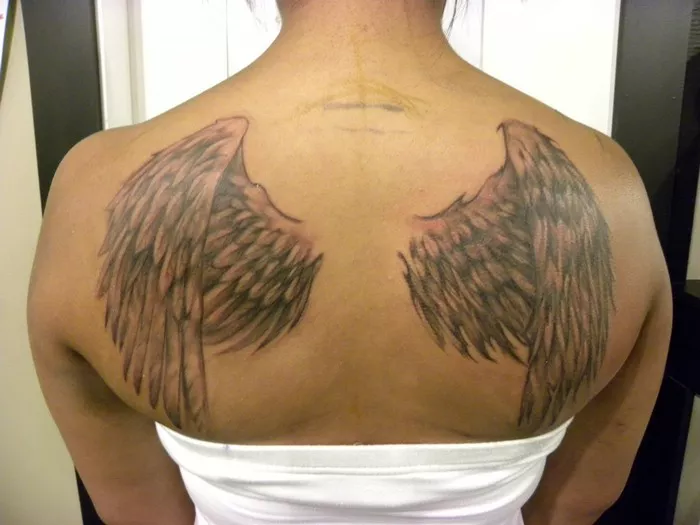Tattoos have long served as a means of self-expression, telling stories, conveying beliefs, or simply adding aesthetic appeal to one’s body. Among the myriad designs adorning human skin, the fallen angel tattoo stands out as both captivating and enigmatic. Its imagery, drawn from religious and mythological sources, carries layers of meaning that resonate with individuals for various personal reasons. In this comprehensive exploration, we delve into the symbolism behind the fallen angel tattoo, uncovering the diverse motivations that drive people to ink this powerful emblem on their bodies.
The allure of rebellion and defiance
One of the primary reasons individuals choose the fallen angel tattoo is its association with rebellion and defiance against conventional norms. Throughout history, angels have been depicted as celestial beings embodying purity, goodness, and obedience to divine authority. However, the concept of a fallen angel introduces a compelling twist—a celestial being who defied God’s will and fell from grace.
For some, the fallen angel tattoo symbolizes a rejection of authority or societal expectations. It represents a desire to assert independence and challenge established rules or beliefs. By adorning their bodies with this imagery, individuals communicate their refusal to conform to conventional standards of behavior or morality. Instead, they embrace the idea of charting their own path, regardless of societal judgment or condemnation.
Embracing the complexities of human nature
Beyond its rebellious connotations, the fallen angel tattoo also speaks to the complexities of human nature. Unlike traditional angelic depictions, which emphasize purity and righteousness, the fallen angel embodies a blend of light and darkness, virtue and vice. This duality resonates with individuals who acknowledge the multifaceted aspects of their own personalities.
For many, the fallen angel tattoo serves as a reminder that humans are inherently flawed yet capable of redemption. It represents the struggle between good and evil within oneself and the journey towards self-awareness and growth. By embracing this symbol, individuals embrace their imperfections as integral parts of their identity, seeking balance and acceptance rather than striving for unattainable perfection.
A symbol of resilience and transformation
The story of the fallen angel is not merely one of descent into darkness but also of resilience and transformation. Despite their fall from grace, fallen angels are often portrayed as figures who endure suffering and undergo profound change. This narrative of redemption and renewal holds deep significance for many individuals who have faced adversity or overcome personal challenges.
For those who bear the fallen angel tattoo, it serves as a testament to their strength and resilience in the face of adversity. It symbolizes the ability to rise above past mistakes or hardships and emerge stronger and wiser. Just as the fallen angel undergoes a transformation, so too do those who wear its image, finding strength and purpose in their ability to overcome obstacles and embrace change.
Exploring religious and mythological influences
The symbolism of the fallen angel tattoo draws heavily from religious and mythological sources, adding layers of depth and meaning to its imagery. In Christian theology, Lucifer, the archangel who rebelled against God and was cast out of heaven, is often depicted as the quintessential fallen angel. His story serves as a cautionary tale of pride, rebellion, and the consequences of disobedience.
Similarly, in various mythologies and folklore traditions, stories abound of divine beings who defy authority or suffer a fall from grace. From the Greek titan Prometheus, who defied the gods to give fire to humanity, to the Norse god Loki, whose mischief and cunning led to his exile and eventual role in Ragnarok, these mythic figures embody the archetype of the fallen angel.
By incorporating elements from these diverse cultural and religious narratives, the fallen angel tattoo becomes a symbol that transcends individual belief systems, resonating with people from different cultural backgrounds and spiritual traditions. It serves as a reminder of the universal themes of redemption, defiance, and the eternal struggle between light and darkness that permeate human existence.
Personal significance and interpretation
Ultimately, the meaning of a tattoo, including the fallen angel design, is deeply personal and subjective. While the symbolism outlined above provides a broad framework for understanding why individuals may choose this particular image, the true significance lies in the unique experiences and perspectives of each person who wears it.
For some, the fallen angel tattoo may represent a specific event or turning point in their lives, such as overcoming addiction, leaving a toxic relationship, or finding the strength to pursue their dreams against all odds. For others, it may serve as a memorial to a loved one who has passed away or a reflection of their own spiritual journey and beliefs.
Regardless of the specific reasons behind their choice, those who opt for the fallen angel tattoo do so with careful consideration and a deep connection to the symbolism it embodies. Whether as a symbol of rebellion, resilience, or spiritual enlightenment, the fallen angel tattoo continues to captivate and intrigue, inviting contemplation and interpretation from all who encounter its enigmatic allure.

